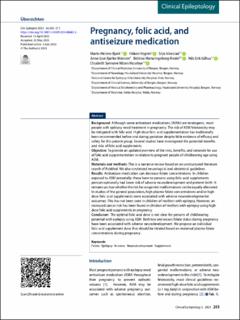| dc.contributor.author | Bjørk, Marte-Helene | |
| dc.contributor.author | Vegrim, Håkon Magne | |
| dc.contributor.author | Alvestad, Silje | |
| dc.contributor.author | Monsen, Anne-Lise Bjørke | |
| dc.contributor.author | Riedel, Bettina Maria Ingeborg | |
| dc.contributor.author | Gilhus, Nils Erik | |
| dc.contributor.author | Husebye, Elisabeth Synnøve Nilsen | |
| dc.date.accessioned | 2024-02-12T12:19:26Z | |
| dc.date.available | 2024-02-12T12:19:26Z | |
| dc.date.created | 2023-09-05T08:57:57Z | |
| dc.date.issued | 2023 | |
| dc.identifier.issn | 2948-104X | |
| dc.identifier.uri | https://hdl.handle.net/11250/3116981 | |
| dc.description.abstract | Background
Although some antiseizure medications (ASMs) are teratogenic, most people with epilepsy need treatment in pregnancy. The risk of ASM fetotoxicity may be mitigated with folic acid. High-dose folic acid supplementation has traditionally been recommended before and during gestation despite little evidence of efficacy and safety for this patient group. Several studies have investigated the potential benefits and risks of folic acid supplements.
Objective
To provide an updated overview of the risks, benefits, and rationale for use of folic acid supplementation in relation to pregnant people of childbearing age using ASM.
Materials and methods
This is a narrative review based on an unstructured literature search of PubMed. We also scrutinized neurological and obstetrical guidelines.
Results
Antiseizure medication can decrease folate concentrations. In children exposed to ASM prenatally, those born to persons using folic acid supplements periconceptionally had lower risk of adverse neurodevelopment and preterm birth. It remains unclear whether the risk for congenital malformations can be equally alleviated. In studies of the general population, high plasma folate concentrations and/or high-dose folic acid supplements were associated with adverse neurodevelopmental outcomes. This has not been seen in children of mothers with epilepsy. However, an increased cancer risk has been found in children of mothers with epilepsy using high-dose folic acid supplements in pregnancy.
Conclusion
The optimal folic acid dose is not clear for persons of childbearing potential with epilepsy using ASM. Both low and excess folate status during pregnancy have been associated with adverse neurodevelopment. We propose an individual folic acid supplement dose that should be titrated based on maternal plasma folate concentrations during pregnancy. | en_US |
| dc.language.iso | eng | en_US |
| dc.publisher | Springer | en_US |
| dc.rights | Navngivelse 4.0 Internasjonal | * |
| dc.rights.uri | http://creativecommons.org/licenses/by/4.0/deed.no | * |
| dc.title | Pregnancy, folic acid, and antiseizure medication | en_US |
| dc.title.alternative | Schwangerschaft, Folsäure und Antiepileptika | en_US |
| dc.type | Journal article | en_US |
| dc.type | Peer reviewed | en_US |
| dc.description.version | publishedVersion | en_US |
| dc.rights.holder | Copyright 2023 The Author(s) | en_US |
| cristin.ispublished | true | |
| cristin.fulltext | original | |
| cristin.qualitycode | 1 | |
| dc.identifier.doi | 10.1007/s10309-023-00602-3 | |
| dc.identifier.cristin | 2172307 | |
| dc.source.journal | Clinical Epileptology | en_US |
| dc.source.pagenumber | 203-211 | en_US |
| dc.identifier.citation | Clinical Epileptology. 2023, 36 (3), 203-211. | en_US |
| dc.source.volume | 36 | en_US |
| dc.source.issue | 3 | en_US |

